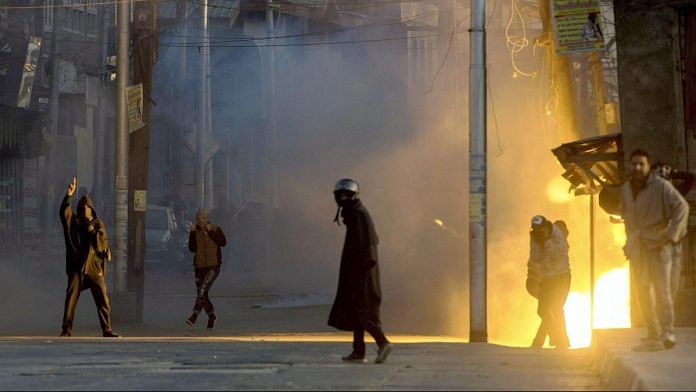A carpet of mutual suspicion covers everybody in Kashmir these days. Nobody knows who is tipping off the army and bringing the boots to your door.
Recently, I went home in Kashmir to attend four weddings, and heard about the killing of a political activist in broad daylight in the Rajpora area of Pulwama district. He was Ghulam Nabi Patel, a lifelong friend of late Jammu and Kashmir chief minister Mufti Mohammad Sayeed. He had contested several elections since 1996, but never won. But in 2014, he joined the PDP and was credited with helping seal Haseeb Drabu’s win in Rajpora constituency.
More importantly, he was my friend’s father.
When I heard the news of Ghulam Nabi’s death, what surprised me was that my friends advised me against calling his daughter. It was not a good time to talk to her, they said. I could not understand the reason. But I obeyed them.
However, after a few days, especially after the Chaharum (fourth-day rites), I called her up and enquired about her and the family. She spoke at length about her father. Ghulam Nabi had been diagnosed with cancer and had just undergone chemotherapy. Doctors had said he was responding well, she said.
Then she said something that was unsettling.
She told me and my companions to not visit her home to offer condolences. She said she feared we could also be targeted. This was very unusual. In the Valley’s years of trauma and unrest, showing up at the home of a bereaved family contributed tangibly to the much-needed process of healing.
“Sajid, I am sorry to say this, but conditions here in Shadimarg are very bad. So, please don’t come to my home,” she said. “It is very hard to trust even our friends and relatives, and only God knows who is who.”
I tried to tell her that things had not deteriorated to such an extent that friends could not stand by each other and help in overcoming the loss. But she didn’t relent.
“The martyrdom of my father helped me overcome this grief. Why mourn when I know he is in heaven for his deeds,” she said. He had been tortured by suspected militants in the 1990s and narrowly escaped death.
But now, strangely, my visit is what she feared most. She just said: “They may target you later”.
Four days after his death, police and the army accused a Hizb-ul-Mujahideen militant Sameer Tiger for Ghulam Nabi’s assassination. On the sixth day, Tiger was killed in an encounter. And yet, rumours swirled. Tiger had earlier sent personal messages to the family indirectly, saying that he had not killed Ghulam Nabi. My friend (Nabi’s daughter) also corroborated this.
Other friends in Pulwama confirmed the prevailing mood of suspicion among people. “You can’t trust even your own friends,” a friend said. “We have spies on both sides playing very smart. It’s better to keep your head down, keep quiet than to fall into these opposing traps.”
What he was saying is that being a mute spectator in a conflict situation can save lives. But that is not the Kashmir I grew up in. However, silence is not a solution. People have to take sides. It is also important to speak up that killing activists, alleged informers, or killing common people will not help stop this never-ending cycle of death.
How does a society live with the prevailing feeling that “the informers are everywhere”? A carpet of mutual suspicion covers everybody. There is a debilitating breakdown of trust among friends and neighbours in south Kashmir. Nobody knows who is tipping off the army and bringing the boots to your door.
What’s worse, sometimes security personnel are believed to have disguised themselves as militants and come to the village to locate militants or dig information about rebels. At times, they also look for OGWs (that dreaded word for over ground workers or helpers of militants). It is a slippery terrain. Villagers, it is believed, have cheered and welcomed these police or army men who are disguised as militants. People regard the militants as sacred.
In this dangerous game, there are also double agents who are betraying everybody.
“You cannot trust anyone who passes you from the front or back,” my friend added.
In this game of hide and seek, the reigning emotions are fear, suspicion and anger. I went home to celebrate weddings, but returned with a suffocating and deathly chill of a new chapter of darkness in the Valley where my friends are not even able to trust their own shadows.




Kashmiris chose their option long ago. They don’t deserve peaceful death too. Shun militancy and get rewarded with peace. What’s wrong with India offering you birth, education, job and family? What more does Islam offer for a decent living? Elite Kashmiris and Pakis don’t live their own home land, why? Cause they are not ready to risk what they have accrued over years, wealth!